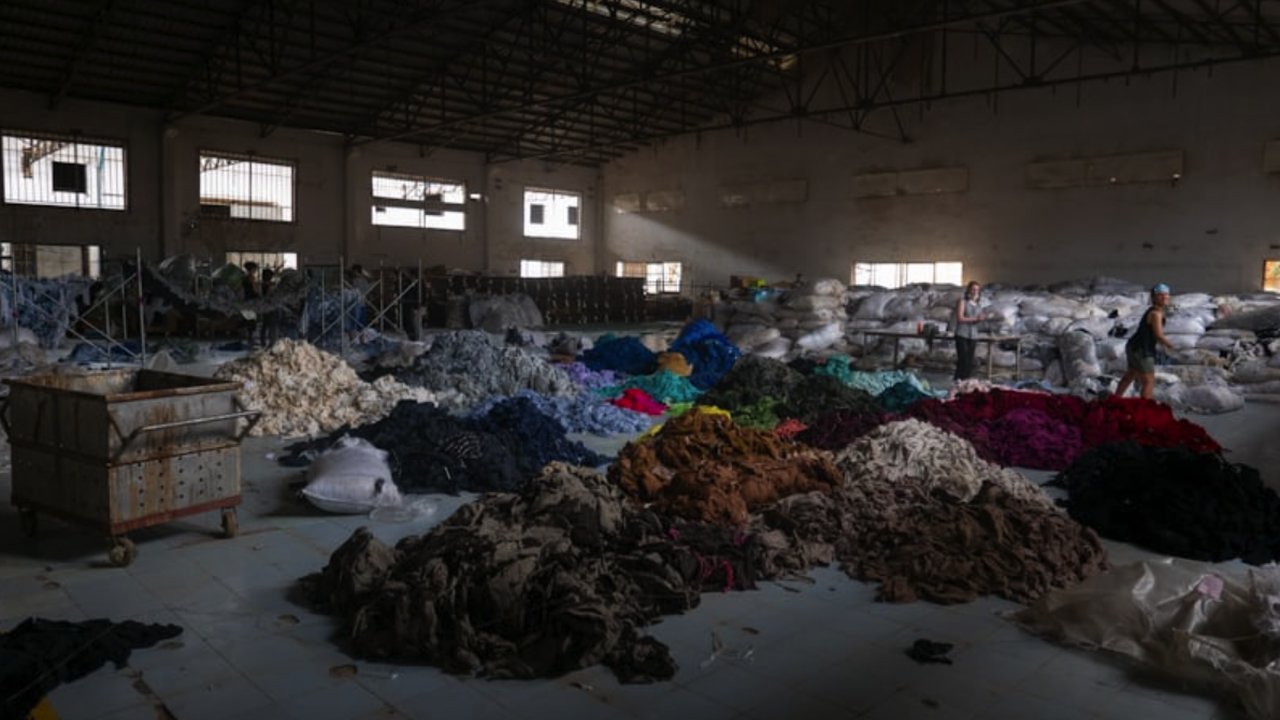 In a surprising move, S&S Activewear has terminated its textile recycling program with nonprofit Give Back Box due to a lack of verifiable data on emissions reduction. The Illinois-based supplier now shifts focus to renewable energy and efficiency upgrades, highlighting the challenges of sustainability initiatives in the supply chain. Despite initial ambitions to drive customer participation, the program's closure raises questions about the complexities of achieving sustainable practices in the apparel industry.
In a surprising move, S&S Activewear has terminated its textile recycling program with nonprofit Give Back Box due to a lack of verifiable data on emissions reduction. The Illinois-based supplier now shifts focus to renewable energy and efficiency upgrades, highlighting the challenges of sustainability initiatives in the supply chain. Despite initial ambitions to drive customer participation, the program's closure raises questions about the complexities of achieving sustainable practices in the apparel industry.
Challenges of Verifiable Sustainability Data
The termination of S&S Activewear's textile recycling program sheds light on the challenges companies face in ensuring verifiable sustainability data. The decision to end the program was driven by the lack of partner-provided data on emissions reduction, raising concerns about the effectiveness of such initiatives. This situation underscores the critical need for transparent and reliable data to support sustainability claims. Without accurate information, companies like S&S struggle to assess the true impact of their sustainability efforts, hindering their ability to make informed decisions and communicate their progress to stakeholders effectively.
The case of S&S Activewear also highlights the complexities involved in measuring the environmental footprint of supply chain initiatives. Companies increasingly rely on data-driven insights to guide their sustainability strategies, but the absence of robust data can impede their efforts to track and improve their performance. Moving forward, businesses must prioritize data transparency and accuracy to build credibility around their sustainability initiatives and demonstrate a genuine commitment to ESG goals. This shift towards data-driven sustainability practices is essential for companies to navigate the evolving landscape of responsible business conduct and meet the growing expectations of investors, consumers, and regulators.
Strategic Shift Towards Renewable Energy and Efficiency Upgrades
Following the discontinuation of its textile recycling program, S&S Activewear has redirected its focus towards renewable energy and efficiency upgrades within its operations. This strategic shift reflects the company's recognition of the importance of addressing its environmental impact through internal initiatives. By investing in renewable energy sources and enhancing operational efficiency, S&S aims to reduce its carbon footprint and improve overall sustainability performance. This move not only aligns with the company's ESG objectives but also signifies a proactive approach to mitigating environmental risks and driving long-term value creation.
The decision to prioritize renewable energy and efficiency upgrades underscores the broader trend among companies to integrate sustainability into their core business strategies. By adopting cleaner energy solutions and optimizing resource utilization, organizations can enhance operational resilience, lower costs, and strengthen their competitive position in a rapidly changing market landscape. As sustainability considerations become increasingly intertwined with business success, initiatives like those undertaken by S&S demonstrate a strategic commitment to driving positive environmental outcomes while safeguarding long-term business viability.
Implications for Supply Chain Partnerships and Collaborations
The discontinuation of the partnership between S&S Activewear and Give Back Box raises important questions about the dynamics of supply chain collaborations in the context of sustainability initiatives. The decision to end the textile recycling program underscores the challenges companies face in finding compatible partners that align with their sustainability goals and provide the necessary data transparency. This development highlights the critical role of trust, accountability, and shared values in fostering successful partnerships that drive meaningful impact and advance sustainability objectives.
The experience of S&S Activewear underscores the importance of due diligence in selecting and managing supply chain partners to ensure alignment on sustainability practices and data sharing protocols. As companies seek to enhance their ESG performance and meet stakeholder expectations, strategic collaborations with like-minded organizations play a pivotal role in accelerating progress towards shared sustainability goals. Moving forward, businesses must prioritize transparency, accountability, and mutual commitment in their partnerships to navigate the complexities of sustainable supply chain management effectively and drive positive environmental and social outcomes.
Conclusion
The case of S&S Activewear's decision to end its textile recycling program with Give Back Box underscores the intricate challenges of achieving verifiable sustainability data in the apparel industry. As companies like S&S pivot towards renewable energy and efficiency upgrades, the imperative for transparent and reliable data becomes paramount. This strategic shift not only aligns with ESG goals but also showcases a proactive stance in mitigating environmental risks. The implications for supply chain partnerships emphasize the necessity of trust, accountability, and shared values in fostering impactful collaborations. In navigating the complexities of sustainable practices, businesses must prioritize data transparency, strategic alliances, and a genuine commitment to ESG goals to drive positive environmental outcomes and long-term business resilience.